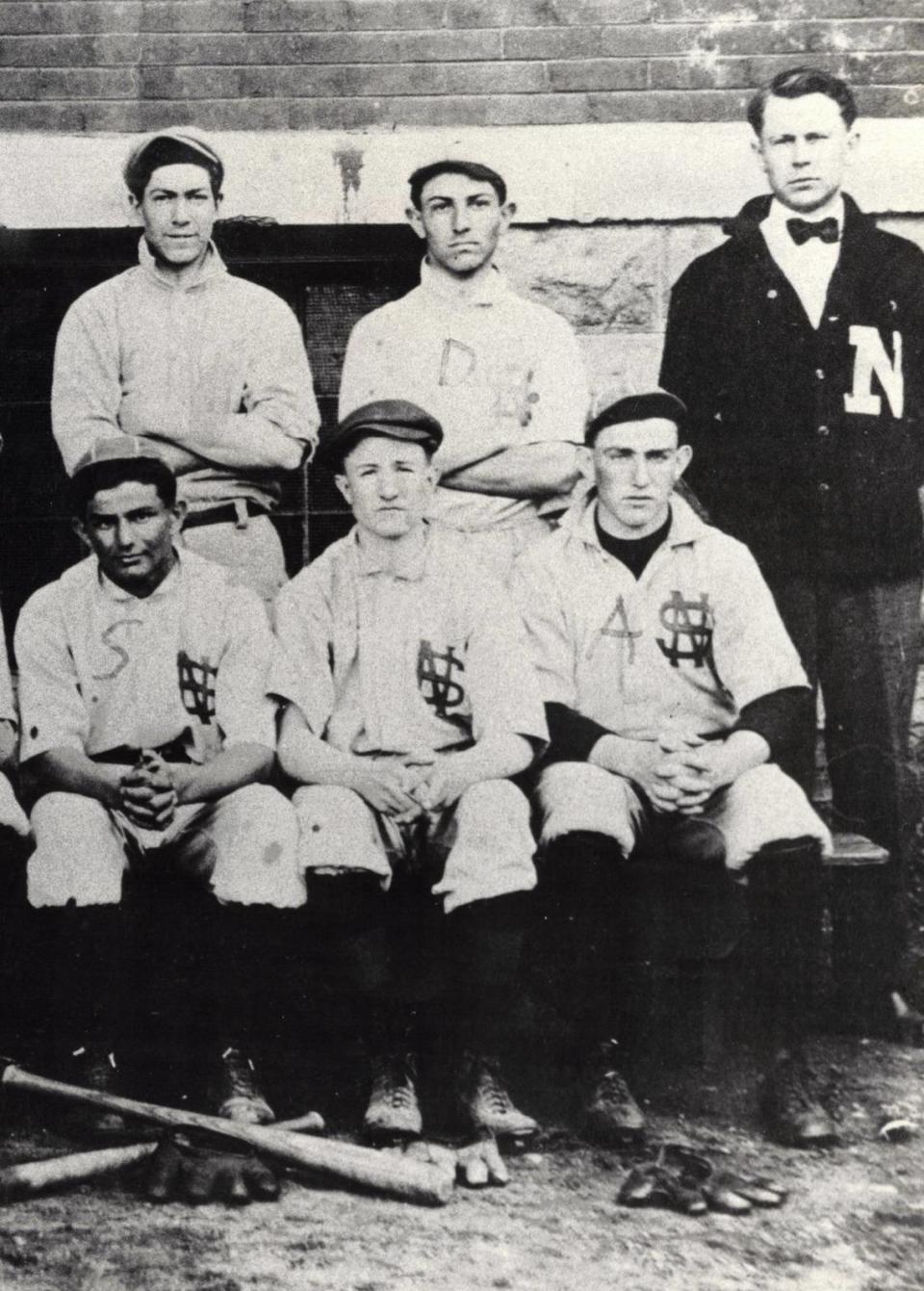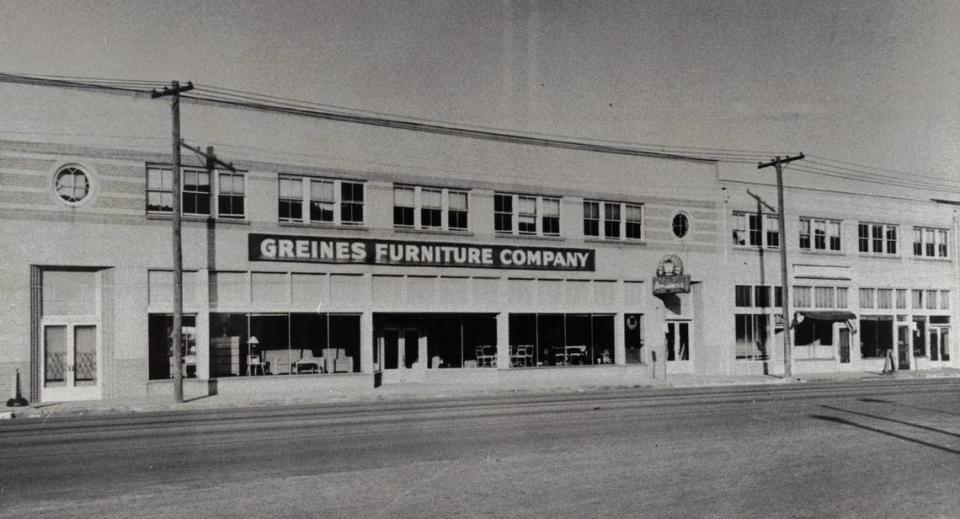Developers revive Fort Worth furniture store that once dominated north side city block
During the first eight decades of the 20th century, the five Greines brothers were so well known in north Fort Worth that no one had to ask how to say the family’s last name. It’s pronounced GRAY-NESS, like the color of the sky on a cloudy day.
All five of the Greines boys — Abe, David, Jake, Mose and Sol — were Shriners, business leaders and athletic boosters. One was a left tackle on North Side High’s first varsity football team in 1911 and later starred as a guard at TCU. Another delivered newspapers on horseback. Two were fraternal twins who served in World War I and practiced law. Another brother chaired the local draft board.
The best-known sibling was Abe, a physician who made house calls. Doc Abe was president of the Park and Recreation Board from 1947 to 1951 and served on the Fort Worth Board of Education for a decade. He helped organize the Fort Worth Boys Club and kept an eye on the boys’ health. He was instrumental in creating the North Fort Worth Little League where teams played on a neighborhood field that carried the Greines name.
For most of the 20th century the Greines surname was on two storefronts — Greines Dry Goods, operated by Jake at 1408-1410 N. Main St., and Greines Furniture Co., which the boys’ Russian-born, Jewish parents Sarah and Meyer, opened in 1904 at 1332 N. Main St.

The furniture store was the family’s premier property. It began in a small section of the old Rosen Inn and gradually took over most of the 100-yard long block — except for the Piggly Wiggly with its tin ceiling at the corner of North Main and Central Avenue.
During the Great Depression, Meyer Greines, the family patriarch whose long beard had turned snowy white, left day-to-day operations to his oldest son, Mose, while he stationed himself in a chair outside the front door and greeted customers by name.
Memories of dining sets, sofas and old-fashioned customer service are resurfacing with the news that the two-story property, stretching from Central Avenue south just up to the QuikTrip gas station, was purchased last year. Fort Worth developers Theron Bryant and Jeff Givens, of Gyant (pronounced “giant”) Properties, are excited to be rehabbing the two-story brick building, with its moderne-style façade.
“It has good bones,” said Bryant. The partners plan to bring back a historic look, inside and out, as well as pedestrian traffic to the block’s wide sidewalks.
At ground level, plans are to create separate shops, totaling 24,000 square feet, for locally owned businesses. The partners envision a restaurant anchoring one end and, farther down the block, a Mexican ice cream and snack shop. That will lend itself to pedestrian traffic on the wide sidewalks.
The upper story, with 12,000 square feet, will ideally be transformed into 16 residential apartments. Vintage wallpaper with floral designs still hangs on some of the walls bordering five-foot tall windows that catch the morning sun. From the west-facing windows, the Hispanic Chamber of Commerce is visible across the street.

The developers are working closely with the chamber’s President and CEO Anette Soto-Landeros and are meeting with neighborhood groups. They are going through the historic tax credit process, bringing the premises up to building codes, and “keeping history in mind,” said Givens. The block is within the Marine Commercial Historic District, which is on the National Register for Historic Places.
The building’s interior echoes days of old. Twin staircases with oak banisters lead to a mezzanine. Vintage fire doors, made of metal and held ajar by ropes, are angled to slide shut in response to flames. Also linking the interior to the past is the original freight elevator.
Edwin Greines Cohen, born in 1934 when his grandparents still worked in the furniture store, recalls the sluggish elevator that carried bedroom suites from the top floor to the showroom.
“I used to love riding in that freight elevator. It moved about one mile an hour,” said Cohen, whose mother, Ida, was the only daughter in the family.
His father, Adolph Cohen, helped managed the store. “We had two big delivery trucks and four delivery men. I went on deliveries occasionally. It was an adventure.”
Behind the store is an alley where he played with Hispanic kids living on North Commerce Street, an adjacent block.
The store served residents of the rapidly growing Stockyards, Northside and Diamond-Hill Jarvis neighborhoods. Admittedly, it was “not the most elegant of furniture stores,” Cohen continued. “It was not an upscale location. The furniture was nice and new but for the working class clientele.”
When his father died in 1986, it fell to Edwin, a professional songwriter, to decide the future of Greines Furniture Co. In 1987, he sold the block to Mulholland, a printing, sign and banner company which has operations in several locations. Mulholland sold it last year for an undisclosed sum.
The family name endures in southeast Fort Worth.
The Wilkerson-Greines Activity Center, a $7.4 million, high school athletic facility with an indoor Olympic-size pool and a 5,000 seat basketball arena, was completed in 1981.
The “Wilkerson” in its name is in memory of Robert G. Wilkerson, longtime principal at J.P. Elder Junior High, who died in 1967. The Greines name honors Doc Abe, the local gridiron star who served on the Board of Education and promoted youth sports throughout his life.
To quote the physician whose name lives on, “I’d hate to see a school system without athletics.”
Hollace Ava Weiner, an author, historian and archivist, is director of the Fort Worth Jewish Archives.

